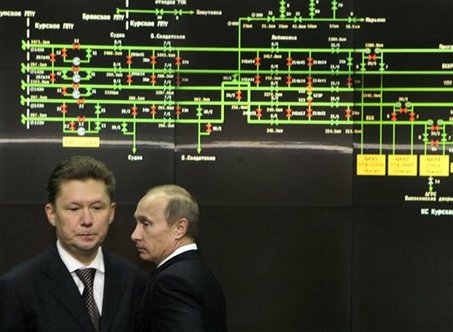
Russian Energy Strategy – the Domestic Political Factor
Publication: Eurasia Daily Monitor Volume: 6 Issue: 185
By:

In 2003 a team of Russian foreign policy and energy experts wrote a 70 page memo about the role of Gazprom, the state-owned gas monopoly, in Russia’s domestic politics and the country’s foreign policy strategy. The document was distributed to a limited number of consumers and was never published. It is in the possession of the Jamestown Foundation.
The findings in the memo remain relevant to this day for they touch upon the very nature of political power in Russia –the nexus between Russia’s vast gas resources and the rulers in the Kremlin. The memo was written at a time when a considerable debate was taking place among high ranking Russian officials as to whether to break up Gazprom into a number of independent companies and create a liberalized Russian gas market or keep Gazprom as a monolithic giant.
But the underpinning of the debate was about political power in Russia. Everyone involved in the debate understood the cardinal rule which dictated political life in post-Soviet Russia –he who controlled Gazprom controlled Russia.
Support for breaking up Gazprom, according to the memo, was spearheaded by a group of former President Boris Yeltsin’s top liberal advisors, who at the time were powerful officials in the Russian Ministry of Economic Development. This group appeared concerned that the new Russian President Vladimir Putin was tying his political career and Russian foreign policy too closely to Gazprom and the company’s new group of managers led by Alexei Miller whom he had placed in power. Once Miller had consolidated the power given to him by Putin, this group of liberals were ousted from the ministry and power shifted to the Putin group.
Miller, according to the authors of the memo, was seen by the former liberal group as an incompetent manager with no experience in the gas business and his new associates were regarded as men from the siloviki faction, in other words loyal Putin supporters from the Federal Security Service (FSB) and the Main Intelligence Directorate of the General Staff (GRU) who were pledged (and handsomely paid) to defend and strengthen Gazprom as a vertically integrated structure; working to promote Putin and his political agenda for restoring Russia as a world power, a goal they all shared.
The memo states that the new Putin team at the Ministry of Economic Development decreed that:
“The right to sell gas to Europe will not be granted to independent producers since this could lead to competition between suppliers and will result in lower prices. The sole export channel will remain ‘Gazexport’ [a fully owned subsidiary of Gazprom now known as Gazprom Export-RK].”
Maintaining the sole export channel for Russian gas is mandatory not only for economic, but also for political needs. The fact is that the Russian authorities often use “gas diplomacy.” If one or another country begins to differ with Moscow on important matters, the volume of Russian gas to that country is decreased.
“If, however, the leaders of this or that country decide to show good will towards the Russian Federation, then the situation with gas deliveries, pricing policy and former debts changes on a far more favorable note to the buyer,” the memo continued.
The authors of the memo point out that with Miller’s ascendency to Gazprom CEO, “the gas monopoly will ensure the financing of Putin’s political projects.” They also point out that the former Gazprom Chairman Rem Vyakherev insisted on maintaining control over Gazprom sponsored companies such as Itera, Sibur, Stroytransgaz and Regiongazholdings. Miller, with the support of the power ministries, rapidly managed to return these assets to Gazprom and thereby please his mentor-Putin. This not only enhanced Gazprom’s assets, it also gave Putin a more powerful financial base on which to rely.
The other major battle at that time involved Russia’s oil companies and their relationship to Gazprom. “The group of St. Petersburg Siloviki,” according to the memo, “cleared the field of all attempts to grab control of the economy…All the major enterprises belonging to the state came under their control.”
At that time, the pro-Putin group began actively supporting the then-minor oil company Rosneft, which began receiving preferential terms from Russia’s SberBank and soon went on to represent Russian interests in oil-related projects in Kazakhstan. Eventually, Rosneft came under the control of Igor Sechin, one of Putin’s most trusted advisors and currently a deputy prime minister and through Sechin’s efforts he was able to confiscate from the Yukos oil company a major part of its assets after the arrest of its owner Mikhail Khodorkovsky.
At this time other Russian oil companies were hoping to gain access to Gazprom’s pipeline system along with the right to export their own gas. This however, has not materialized to this day. The Russian domestic gas market, which is fully controlled by Gazprom’s ownership of all trunk pipelines and most of the low-pressure local distribution pipelines, allows the gas monopoly to control gas sales by oil companies, a situation which continues to be a major point of conflict between Putin and the few remaining independent Russian oil companies.
“This [Gazprom’s control over the pipelines] gives Putin a major edge over domestic and foreign policy. The president, thanks to Gazprom, is able to exert pressure on oil companies and on regional leaders,” according to the authors of the memo.
In today’s emerging competition for political power in Russia between President Dmitry Medvedev and Putin, the key element remains the same as it was in 2003 –control over Gazprom and its elaborate system of domination over both the export of gas and its control of domestic gas distribution (Jamestown Blog on Russia and Eurasia, September 8).
Putin has placed his cards on the table by declaring that only Gazprom will be allowed to export gas abroad for the foreseeable future. While Medvedev is not opposed to this in principle, he obliquely persists in questioning Putin’s handling of Gazprom’s long-term strategy and appears to be playing off the contradictions between the oil companies’ demands and Putin’s trump card, Gazprom, in what seems to be a major power struggle. Ultimately this is not based on ideological differences over such mundane matters as democracy in Russia, but on a savage no-holds-barred fight for assets and power over who will control Gazprom in the long term.




